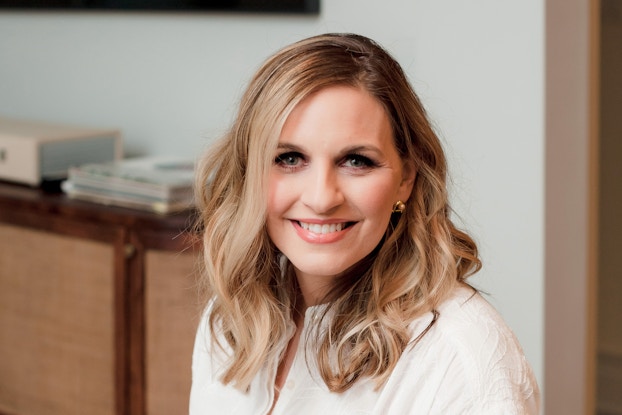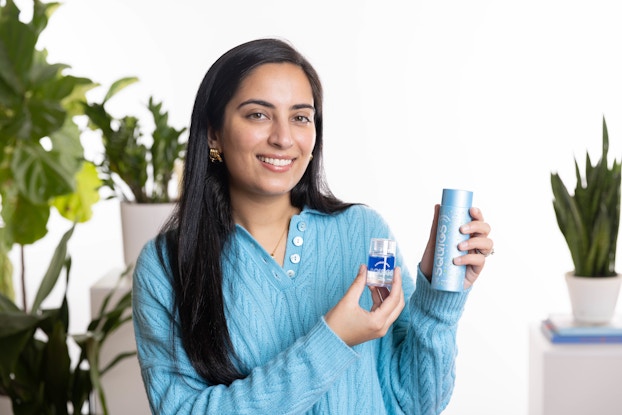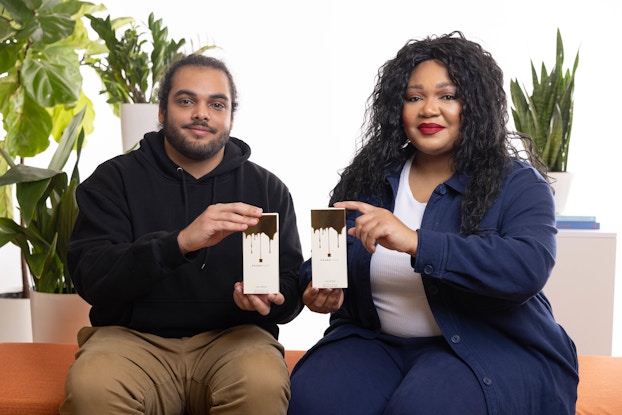
Why it matters:
- Products for and created by Black, indigenous, and people of color (BIPOC), including beauty products, are underfunded and underserved on retail shelves.
- Ulta Beauty created the MUSE Accelerator to help even the playing field in the beauty industry.
- The second iteration of the program kicked off this month. Those selected receive mentoring by heavyweights in the beauty industry on how to scale, brand strategy, and $50,000 to continue their entrepreneurship journey.
Ulta Beauty, the nation’s largest beauty retailer, is helping nascent BIPOC brands grow big, too.
The retailer announced the second edition of its MUSE Accelerator on June 1, a program designed to bolster early-stage beauty brands with BIPOC founders.
MUSE 100, a grant program highlighting Black beauty creators and entrepreneurs, first kicked off in 2021.
MUSE marks an extension of Ulta’s ongoing diversity, equity, and inclusion efforts.
Those efforts include signing “The 15% Pledge,” devoting 15% of its shelf space to Black-owned brands, as Black people make up 15% of the U.S. population, and committing $25 million to DEI initiatives.
“MUSE is an opportunity for us to continue to support and amplify underrepresented voices,” Jessica Phillips, Vice President of Merchandising at Ulta Beauty, told CO—. “As a merchant organization, we want to curate and nurture a diverse [product] assortment. There is so much inequity in beauty on our shelves and in terms of investments in brands. Only about 3% of venture and private equity funding goes to BIPOC founders. There was an opportunity to put dollars behind the effort. We also want to close the wealth gap and we've seen how successful the beauty industry has been in building millionaires and billionaires, and if we can play a smart part in closing that gap, it is a win.”

‘Participants learned what it takes to get their brand ready for a big retailer like Ulta Beauty’
After sifting through hundreds of applicants, the Ulta Beauty team selected the first cohort of early-stage BIPOC-founded brands that include Squigs, Ourside, Bonita Fierce Candles, Sade Baron, YINA, The Refig, Dehiya Beauty, and Pound Cake.
The founders of each brand were paired with mentors who offered firsthand advice. These included heavyweights in the beauty industry such as Ron Robinson, Cosmetic Chemist and Founder of BeautyStat.
Robinson mentored YINA, a fast-growing skin care and wellness brand inspired by traditional Chinese medicine and already carried by Ulta, he told CO—.
"Participants learned what it takes to get their brand ready for a big retailer like Ulta Beauty, how to get their supply chain ready to scale, how to hone their marketing message to make them stand out in a crowded space, and how to fundraise," he said. "And I learned that I might be able to make a difference in helping them achieve their business dreams.”
In addition to mentorship, the curriculum included training in brand strategy, advice on how to succeed in retail, and navigating supply chain logistics. It concluded with pitches to investors and Ulta Beauty merchants. Each brand received a $50,000 capital infusion.
While there are other accelerators in the beauty industry, such as Target Takeoff, Walmart Start, and Sephora Accelerate, Ulta’s Phillips said the retailer’s investment is unique, as other programs typically offer favorable payment terms, stipends, introductions to venture capital firms, and other perks. “The $50,000 really helps these founders. It provides a bit of relief.”
We also want to close the wealth gap and we've seen how successful the beauty industry has been in building millionaires and billionaires, and if we can play a smart part in closing that gap, it is a win.Jessica Phillips, Vice President of Merchandising, Ulta
‘We think about that advice now when we are talking to investors’
The money is great, but participants from the first class said the rewards stretched well beyond the check.
For Camille Bell and Johnny Velazquez, the founders of Pound Cake, exposure via MUSE not only resulted in retail distribution at Ulta, but support for its seven-year-old brand that addressed a gap in the market for lipsticks that delivered as promised. “There are lipsticks advertised for skin tones, but lip tone also affects the way products show up on people. The idea came from personal experience. I would try on a lipstick, and it didn’t look the same on me as it was advertised,” said Bell.
The co-founders participated in other accelerators and crowdfunding over the years as they hit speed bumps on the road to launch, including finding a chemist to work with small batches that met their specific needs. Pound Cake debuted direct-to-consumer, but the founders saw the need to raise funds and seek physical distribution as the costs of customer acquisition skyrocketed.
“Gone are the days where you can find an influencer and say, ‘In exchange for you posting, can I give you free product?’ Now, I have to give the product, pay for the shipping, and get charged $8,000 to post a TikTok. For people like me, you have to become your own TikTok creator because it is more cost-effective,” Bell said. In addition to the fall debut at Ulta Beauty, Pound Cake is sold on its website and at Credo. The founders said they plan to expand beyond lip color.
Among the most important takeaways from Ulta’s MUSE accelerator was making her products shelf-ready for retail. “Now that we have the funding, I was able to find a professional agency to do a product refresh,” she said. Other valuable input came from speakers who have sold their companies. Advice from one founder who sold her brand encouraged Bell to speak to people who sold their companies to find out how they were treated after the investment. “We think about that advice now when we are talking to investors,” she said, which could help the brand gear up for retail expansion.
Moreover, Bell was doing her own bookkeeping. “After presentations during MUSE, I hired a very small, affordable boutique to do bookkeeping. It is stuff like that, those amazing little nuggets, I’m applying,” she said.
Selection for MUSE and other accelerators does not guarantee product placement. “We are preparing brands for retail,” said Phillips. “That may be today, it may be five years from now. It may be at Ulta Beauty or it may be somewhere else. This is purpose-driven work.”

‘What goes on in stores? What happens in the warehouse? Most brands don’t really learn what goes into a retail launch until they are into it’
Rushing into brick and mortar can be devastating, according to BeautyStat’s Robinson. "The biggest mistake brands make is trying to get into a big retailer before they have developed their own DTC channel. It is critical to understanding who your customer is and that can help you be a better partner with a retailer because you will drive customers to that retailer," Robinson said.
That’s exactly what Nikita Charuza is doing as she builds her one-year-old hair and skincare brand, Squigs. The former beauty editor was inspired to found the brand, which she calls “happy hair and skincare,” by her South Asian heritage and love of ayurvedic ingredients. “I want to take my time and see if I have legs to stand on. We are getting a lot of traction and it is exciting to see people like what we are providing.”
Participating in MUSE taught Charuza the nuts-and-bolts knowledge required to survive in retail. “I think of myself as a sponge. I don't think you can grow as a brand without feedback,” she said. “It was great to meet the Ulta team and get a foot in the door. I was pleased to hear that they love my products, my mission, and that I am on the right track. It was a huge feat in my eyes to be their first cohort and the only South Asian-owned and inspired brand.”
Selling into a major retailer can be a make-or-break experience for a nascent brand. The sheer volume of products needed to ship to stores can put a brand in financial peril.
Beauty Independent reported that as much as 70% of the sales generated in the first year of breaking into retail should be dedicated to marketing to support the retail business. A retail launch could cost anywhere between several hundred thousand dollars to $1 million or more. Many brands don’t break even until a few years into the launch. The experience with MUSE could help Squigs avoid the pitfalls, Charuza said.
“Being an editor, I knew how a brand launched, but not what a retailer looks for in a brand. What goes on in stores? What happens in the warehouse? Most brands don’t really learn what goes into a retail launch until they are into it,” she added.
Currently sold on Squigs’ own e-commerce site and through Urban Outfitters, Charuza believes an omnichannel strategy fits her brand. “As we continue to grow, my hopes and dreams are to be a brand you can find at various retailers, too.”
CO— aims to bring you inspiration from leading respected experts. However, before making any business decision, you should consult a professional who can advise you based on your individual situation.
CO—is committed to helping you start, run and grow your small business. Learn more about the benefits of small business membership in the U.S. Chamber of Commerce, here.

What can membership do for your business?
Gain tools to stay informed, competitive, and connected by becoming a U.S. Chamber of Commerce member. Membership gives you direct access to expert policy insights, economic updates, and exclusive resources designed to help your business thrive. From behind-the-scenes analysis from D.C. to exclusive discounts and expert support, U.S. Chamber membership helps you navigate change and seize new opportunities.







